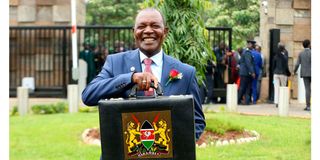Inside Ruto’s Plan B should court throw out Finance Act

National Treasury Cabinet Secretary Njuguna Ndung’u at Parliament Buildings for the reading of the 2023/24 Budget Statement on June 15, 2023.
President William Ruto has lined up painful alternative tax measures that will enable his administration to plug revenue shortfalls resulting from the temporary suspension of the Finance Act, 2023.
The Court of Appeal will on July 28 rule on whether to lift the suspension as sought by National Treasury Cabinet Secretary Prof Njuguna Ndung’u.
Through Attorney-General Justin Muturi, Prof Ndung’u argued that the freeze is affecting implementation of government operations and that the administration stands to lose about Sh211 billion in revenues in the current financial year, which would force some key projects to be suspended.
Prof Ndung’u has however revealed to the International Monetary Fund (IMF) the contingency tax measures that the government is preparing to roll out to plug any deficits in revenue.
“Contingencies to contain the overall fiscal balance within available margins are appropriate. FY 2023/24 revenue package in the draft Finance Bill will be critical to achieve the tax path envisaged under the program and to further reduce the fiscal deficit, while making room for needed social and development spending,” said Prof Ndung’u.
One of these tax measures include introduction of a motor vehicle circulation tax. Countries that have implemented this tax have done so through an annual registration fee for vehicle owners to use public roads.
Also Read: Meet the judge blocking Ruto taxes
Official estimates indicate that Kenya has some 4.53 million vehicles, while thousands more are imported into the country annually. For instance, some 99,239 motor vehicles landed at the port of Mombasa last year, according to data from the Kenya National Bureau of Statistics.
Such a tax would be a heavy blow to motorists at a time they are already paying historic high prices of fuel.
Treasury is also eyeing reducing exemptions of some goods and services from paying value added tax (VAT) as well as cutting exemptions on interest paid by the government.
CS Ndung’u said these tax measures would be submitted to Parliament for approval by end of October this year alongside the first supplementary budget for FY 2023/24.
The IMF has backed Treasury’s alternative measures to raise revenue amid global uncertainties that could affect the performance of the economy during the period thus diminishing revenue collection.
“Recent challenges in resource mobilization and elevated uncertainty call for contingency plans that can be quickly deployed to ring-fence fiscal performance going forward. Tighter financing conditions also require a prudent debt policy and continued efforts to prioritize concessional loans,” said IMF Deputy Managing Director Antoinette Sayeh.
“The authorities commit to take corrective measures on tax revenues to remedy the underperformance in taxes and ensure it does not impact achievement of the FY 2023/24 tax targets,” IMF added.
President Ruto last month assented to the controversial Act, but its implementation was temporarily suspended days later by Justice Mugure Thande, throwing into turmoil the Head of State’s revenue-raising measures for his Sh3.68 trillion debut budget.
Some of the painful tax measures in the Act include doubling VAT on fuel to 16 per cent from 8 per cent, and a mandatory 1.5 per cent housing tax to be deducted from the monthly pay of all workers. The Energy and Petroleum Regulatory Authority defied the court order and raised fuel prices on the same day that the Act was to take effect.
The Ruto administration seeks to raise an additional Sh289 billion from the new tax measures to fund the budget.
The IMF has thrown its weight behind the Act, stating that it is in line with Kenya’s fiscal sustainability through raising enough revenue to reduce the fiscal deficit and therefore contain borrowing.
“The approval of the FY2023/24 Budget and 2023 Finance Act are crucial steps to support ongoing consolidation efforts to reduce debt vulnerabilities while protecting social and development expenditures,” said Ms Sayeh.
The Kenya Revenue Authority collected Sh2.17 trillion in tax revenue in the 2022/2023 financial year, missing its target by Sh107 billion.
The tax agency cited the prevailing tough economic environment as the reason for missing the target, with traditional high-performers such as customs taxes falling below target. Of the Sh107 billion missed by KRA in its target for 2022/23, Sh34.6 billion is attributable to customs.





